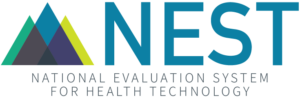November 18, 2020
The objective of this Test-Case was to develop and pilot a patient-facing mobile app to be integrated with a newly created national Stress Urinary Incontinence (SUI) registry. This project focused on mesh-based mid-urethral slings, which are already approved for use in SUI surgery but have known limitations. The Test-Case utilizes the newly developed application to collect Patient-Reported Outcomes (PROs) across the SUI registry sites to assess the impact of mesh-based mid-urethral slings on PROs.
We were joined by several of the project leaders at the NEST Forum. Below are several key findings from the discussion:
NEST Test-Cases provide the opportunity for network collaborators to focus on specific groups of stakeholders.
Mr. Keondae Ervin, NESTcc Project Manager, noted the importance of this Test-Case for the medical device manufacturing ecosystem, “This Test-Case provides a unique opportunity to truly understand our research networks at NEST and support studies that focus on a specific demographic group with that patient-centered focus and input.”
Real-world evidence studies provide opportunities to capture the voice and outcomes of patients.
Ms. Anne Hammer of CDRH called attention to the positive impact NEST Test-Cases have on patients, “The project we heard about today is a prime example of how CDRH regularly collaborates with external stakeholders to advance the development and validation of PROs for regulatory issues. We hope to continue to do so to promote the inclusion of the patient voice in the evaluation.” NESTcc understands that collaboration among diverse stakeholders is crucial for medical device research.
NEST Test-Case addresses the need for Patient-Reported Outcomes that can facilitate long-term assessment of medical devices.
Dr. Bilal Chughtai, Weill Cornell Medicine, underscored the value of PROs for a thorough assessment of medical devices in his presentation, “We need Patient-Reported Outcomes because they help facilitate proper assessment of the benefits and risks of these devices using real-world data. We need something that is user-friendly, secure, robust, and patient-facing that can enable data collection to be integrated within registries. This can facilitate the monitoring of long-term critical assessment of efficacy, safety, as well as patient satisfaction with these devices.”
Dr. Chughtai further explained how the patient-facing mobile app meets the demand for PROs: “Overall, when we look at the limitations of administrative datasets in retrospective studies, patient data are frequently lost to relocation, changes in insurance status, changes in the EHR system, or subsequent visits that are non-surgical. With this mobile app, these factors no longer bind the data. The digital platform, ease of access, and usability resulted in our ability to capture these events.”
We look forward to deepening collaboration and research on PROs, a key topic that affects stakeholders across the medical device ecosystem.
View the recording of this Test-Case presentation from the NEST Forum.
The NEST Forum shared insights and perspectives on NEST’s use of real-world data to move safety and innovation forward and help change the paradigm of clinical research. We are grateful for the medical device ecosystem leaders who joined us and look forward to continued conversation and collaboration on issues of pressing importance to health care.
All session recordings are available on the NEST Forum event page.

